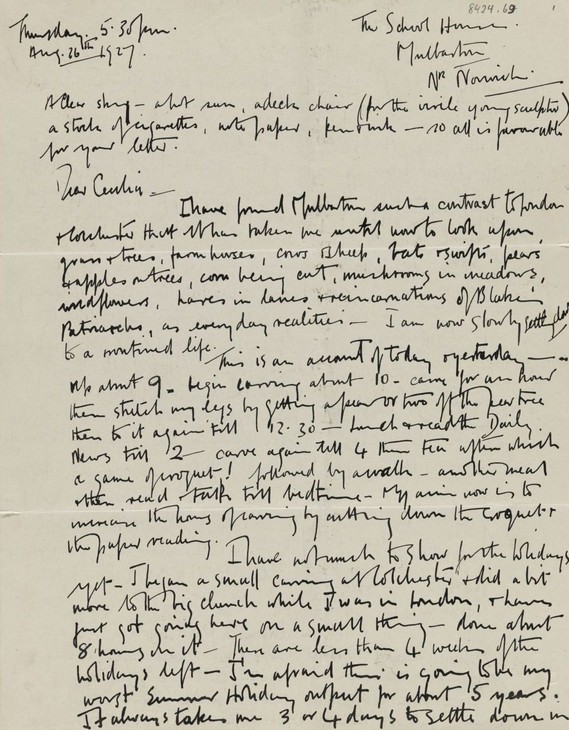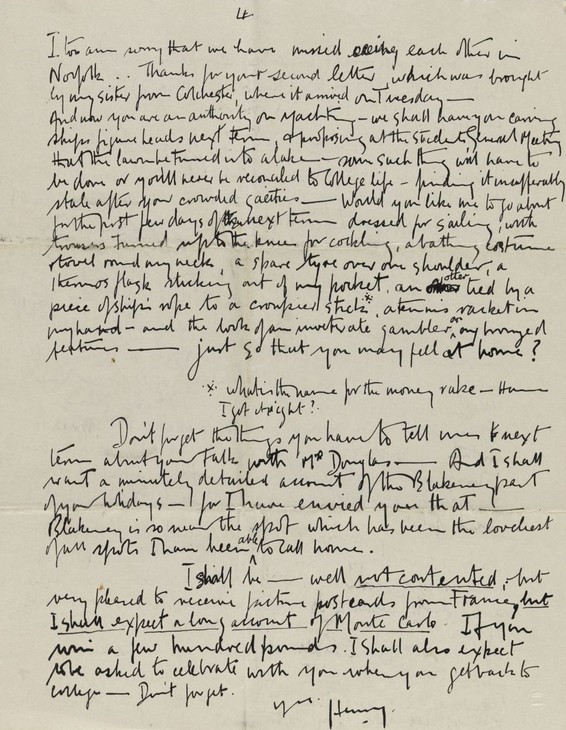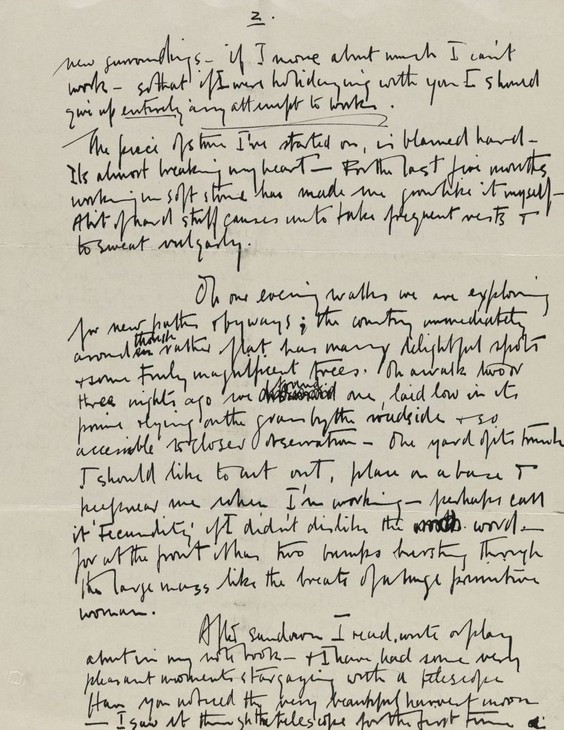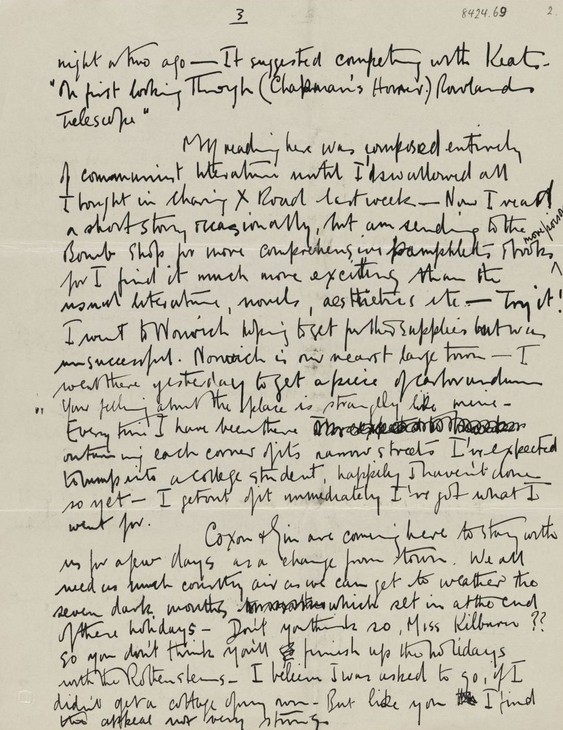Moore met Cecilia Sempill (née Dunbar Kilburn) when she was a student at the Royal College of Art (from 1924 to 1928). Here he chattily describes his vacation at his sister’s house in Mulbarton, Norfolk, as a mixture of carving, croquet and reading. Importantly, he reveals that his reading was nearly all composed of communist literature, which he found more interesting than novels or books on aesthetics.
Transcript
[Handwritten:]
Thursday. 5.30pm The School House
Aug. 26th 1927. Mulbarton
Nr Norwich
Aug. 26th 1927. Mulbarton
Nr Norwich
A clear sky - a hot sun, a deck chair (for the virile young sculptor) a stock of cigarettes, note pppaper, pen and ink – so all is favourable for your letter.
Dear Cecilia,
I have found Mulbarton such a contrast to London and Colchester that it has taken me until now to look upon grass and trees, farm houses, cows and sheep, bats and swifts, pears and apples on trees, corn being cut, mushrooms in meadows, wildflowers, hares in lanes and reincarnations of Blake’s patriarchs, as everyday realities – I am now slowly settling down to a routined life.
This is an account of today and yesterday – up about 9 – begin carving about 10 – carve for an hour then stretch my legs by getting a pear or two off the pear tree then to it again until 12.30 – lunch and read the Daily News till 2 – carve again till 4 then tea after which a game of croquet! Followed by a walk – another meal then read and talk till bedtime – My aim now is to increase the hours of carving by cutting down the croquet and paper reading.
I have not much to show for the holidays yet – I began a small carving at Colchester and did a bit more to the big church while I was in London, and having just got going here on a small thing – done about eight hours on it – there are less than four weeks of the holidays left – I’m afraid this is going to be my last Summer Holiday output for about 5 years. It always takes me 3 or 4 days to settle down in [end of p.1] new surroundings – if I write about much I can’t work – so that if I were holidaying with you I should give up entirely any attempt to work.
The piece of stone I’ve started on, is blamed hard – It’s almost breaking my heart – For the last five months working in soft stone has made me grow like it myself – A bit of hard stuff causes me to take frequent rests and to sweat vulgarly.
On our evening walks we are exploring for new paths and by-ways; the country immediately around though rather flat has many delightful spots and some truly magnificent trees. On a walk two or three nights ago we found one, laid low in its prime lying on the grass by the roadside and so accessible to closer observation – one yard of its trunk I should like to cut out, place on a base and keep near me when I’m working – perhaps call it ‘Fecundity’ if I didn’t dislike the word. – For at the front it has two bumps bursting through the large mass like the breasts of a huge primitive woman.
After sundown I read, write or play about in my workbook – and I have had some very pleasant moments stargazing with a telescope. Have you noticed the very beautiful harvest moon – I saw it through the telescope for the first time a [end of p.2] night or two ago – It suggested competing with Keats – “on first looking through (Chapman’s Horner.) Rowlands Telescope”.
My reading here was composed entirely of communist literature until I’d swallowed all I bought in Charing X Road last week – Now I read a short story occasionally, but am sending to the Bomb Shop for more comprehensive pamphlets and books - more poison – for I find it much more exciting than the usual literature, novels, aesthetics etc. – Try it! I went to Norwich hoping to get further supplies but was unsuccessful. Norwich is the nearest large town – I went there yesterday to get a piece of carborundum. Your feeling about the place is strangely like mine – Every time I have been there on turning each corner of its narrow streets I’ve expected to bump into a college student, happily I haven’t done so yet – I get out of it immediately I’ve got what I went for.
Coxon and Gin are coming here to stay with us for a few days as a change from town. We all need as much country air as we can get to weather the seven dark months which set in at the end of these holidays – Don’t you think so, Miss Kilburn?? So you don’t think you’ll finish up the holidays with the Rothensteins – I believe I was asked to go, if I didn’t get a cottage of my own – But like you I find the appeal not very strong. [end of p.3]
I too am sorry that we have missed seeing each other in Norfolk ... Thanks for your second letter which was brought by my sister from Colchester, where it arrived on Tuesday – And now you are an authority on yachting – we shall have you carving ships figure heads next term, and promising the Students General Meeting that the lawn be turned into a lake – some such thing will have to be done or you’ll never be reconciled to college life – finding it insufferably stale after your crowded gaieties – Would you like me to go about for the first few days of next term dressed for sailing, with trousers turned up to the knee for cockling, a bathing costume and towel around my neck, a spare tyre over one shoulder, a thermos flask sticking out of my pocket, an otter tied by a piece of ship’s rope to a croupier stick* (*what is the name for the money rake – have I got it right?), a tennis racket in my hand – and the look of an inveterate gambler on my bronzed features – just so that you may feel at home?
Don’t forget the things you have to tell me next term about your talk with Mr Douglas – And I shall want a minutely detailed account of the Blakeney part of your holidays – for I have envied you that – Blakeney is so near the spot which has been the loveliest of all spots I have been able to call home.
I shall be – well not contented, but very pleased to receive picture postcards from France but I shall expect a long account of Monte Carlo. If you win a few hundred pounds I shall also expect to be asked to celebrate with you when you get back to college –Don’t forget.
Yours,
Henry
How to cite
‘’, in Henry Moore: Sculptural Process and Public Identity, Tate Research Publication, 2015, https://www




